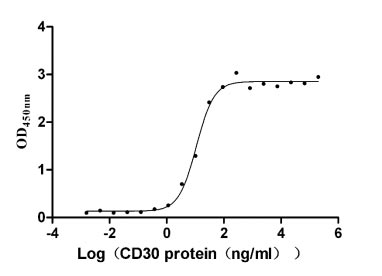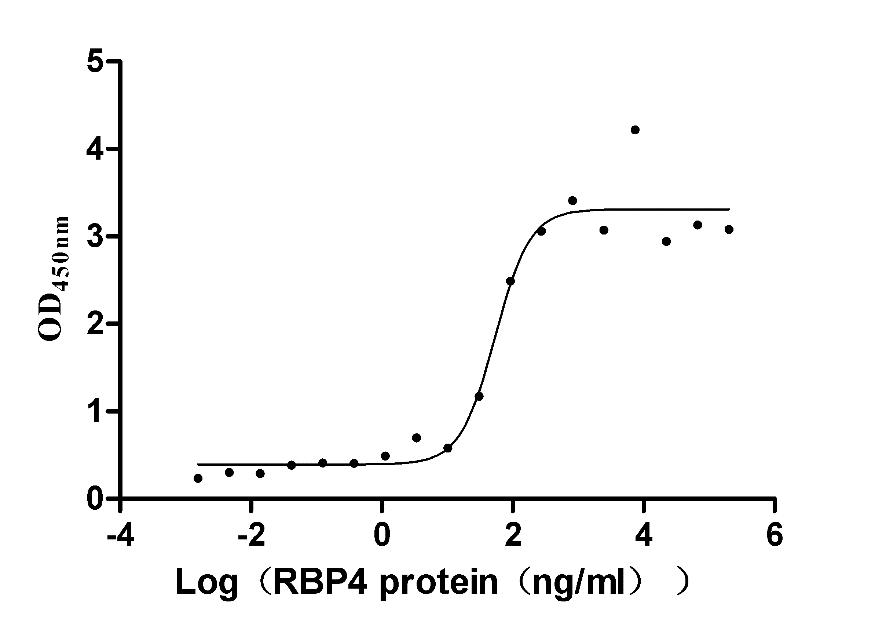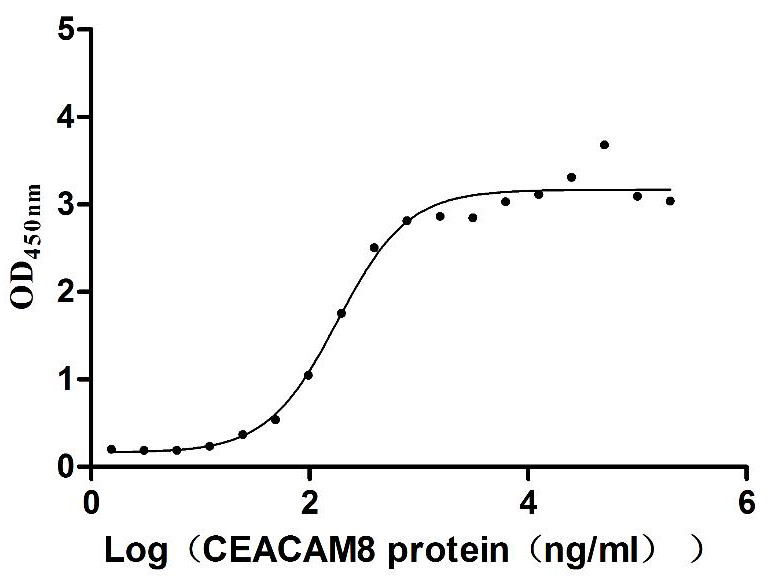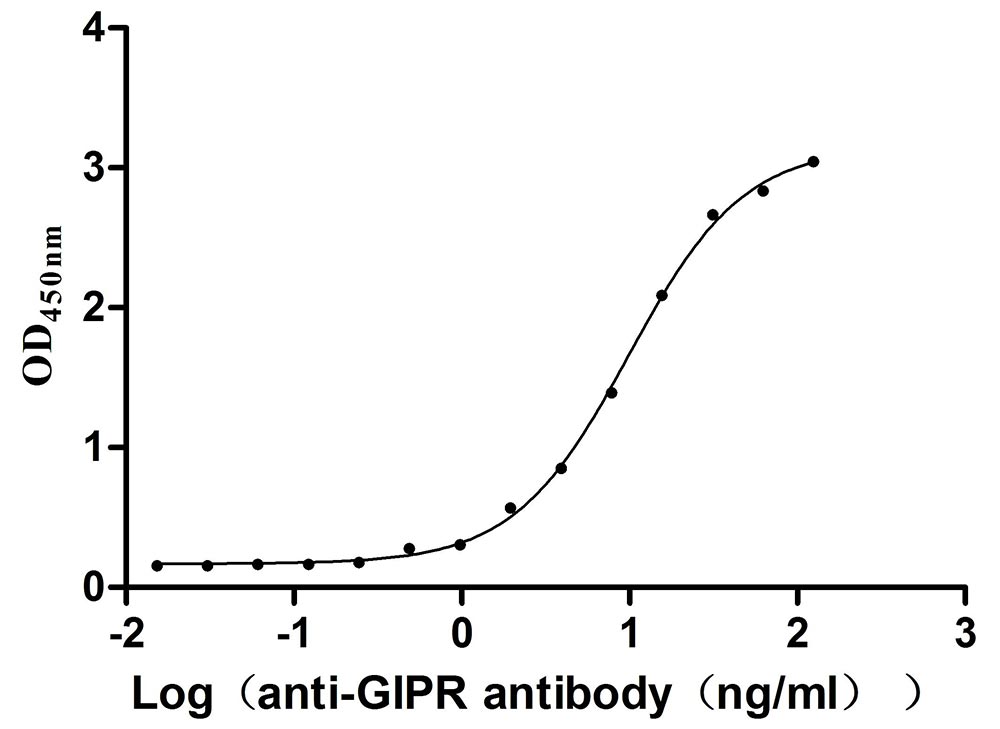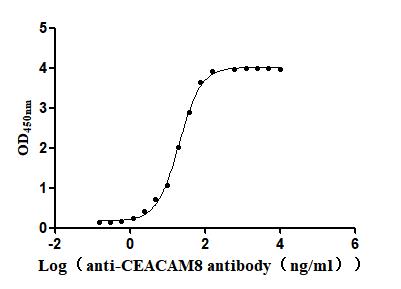Recombinant Rat Mineralocorticoid receptor (Nr3c2), partial
-
中文名称:大鼠Nr3c2重组蛋白
-
货号:CSB-YP016061RA
-
规格:
-
来源:Yeast
-
其他:
-
中文名称:大鼠Nr3c2重组蛋白
-
货号:CSB-EP016061RA
-
规格:
-
来源:E.coli
-
其他:
-
中文名称:大鼠Nr3c2重组蛋白
-
货号:CSB-EP016061RA-B
-
规格:
-
来源:E.coli
-
共轭:Avi-tag Biotinylated
E. coli biotin ligase (BirA) is highly specific in covalently attaching biotin to the 15 amino acid AviTag peptide. This recombinant protein was biotinylated in vivo by AviTag-BirA technology, which method is BriA catalyzes amide linkage between the biotin and the specific lysine of the AviTag.
-
其他:
-
中文名称:大鼠Nr3c2重组蛋白
-
货号:CSB-BP016061RA
-
规格:
-
来源:Baculovirus
-
其他:
-
中文名称:大鼠Nr3c2重组蛋白
-
货号:CSB-MP016061RA
-
规格:
-
来源:Mammalian cell
-
其他:
产品详情
-
纯度:>85% (SDS-PAGE)
-
基因名:Nr3c2
-
Uniprot No.:
-
别名:Nr3c2; MlrMineralocorticoid receptor; MR; Nuclear receptor subfamily 3 group C member 2
-
种属:Rattus norvegicus (Rat)
-
蛋白长度:Partial
-
蛋白标签:Tag type will be determined during the manufacturing process.
The tag type will be determined during production process. If you have specified tag type, please tell us and we will develop the specified tag preferentially. -
产品提供形式:Lyophilized powder
Note: We will preferentially ship the format that we have in stock, however, if you have any special requirement for the format, please remark your requirement when placing the order, we will prepare according to your demand. -
复溶:We recommend that this vial be briefly centrifuged prior to opening to bring the contents to the bottom. Please reconstitute protein in deionized sterile water to a concentration of 0.1-1.0 mg/mL.We recommend to add 5-50% of glycerol (final concentration) and aliquot for long-term storage at -20℃/-80℃. Our default final concentration of glycerol is 50%. Customers could use it as reference.
-
储存条件:Store at -20°C/-80°C upon receipt, aliquoting is necessary for mutiple use. Avoid repeated freeze-thaw cycles.
-
保质期:The shelf life is related to many factors, storage state, buffer ingredients, storage temperature and the stability of the protein itself.
Generally, the shelf life of liquid form is 6 months at -20°C/-80°C. The shelf life of lyophilized form is 12 months at -20°C/-80°C. -
货期:Delivery time may differ from different purchasing way or location, please kindly consult your local distributors for specific delivery time.Note: All of our proteins are default shipped with normal blue ice packs, if you request to ship with dry ice, please communicate with us in advance and extra fees will be charged.
-
注意事项:Repeated freezing and thawing is not recommended. Store working aliquots at 4°C for up to one week.
-
Datasheet :Please contact us to get it.
靶点详情
-
功能:Receptor for both mineralocorticoids (MC) such as aldosterone and glucocorticoids (GC) such as corticosterone or cortisol. Binds to mineralocorticoid response elements (MRE) and transactivates target genes. The effect of MC is to increase ion and water transport and thus raise extracellular fluid volume and blood pressure and lower potassium levels.
-
基因功能参考文献:
- We propose that, in the spontaneously hypertensive rat hippocampus, increased MR expression causes a bias towards a pro-inflammatory phenotype characteristic for hypertensive encephalopathy. PMID: 28523794
- MR signaling does not play a role in ERK and CREB phosphorylation nor in tyrosine hydroxylase expression in the nucleus of tractus solitaries. PMID: 26598419
- A NeuroD family member (NeuroD2) binding to an additional motif near the Glucocorticoid receptor response element seems to drive specificity for Mineralocorticoid receptor over glucocorticoid receptor binding at hippocampal binding sites. PMID: 28324065
- The scaffolding protein RACK1 is associated with mineralocorticoid receptor (MR) under basal and agonist-stimulated conditions and facilitates agonist-stimulated MR actions through PKC-beta. These findings indicate that RACK1 is a newly described coactivator of MR. PMID: 28472300
- MR-immunoreactivity and 11beta-Hydroxysteroid dehydrogenase 2-in situ hybridised products are colocalised in magnocellular neurosecretory cells. PMID: 26403275
- The discovered changes in the expression level of catechol-o-methyltransferase , mineralocorticoid receptor , and b-subunit of epithelial sodium channel confirm their involvement in increased sympathetic stimulation of the of hypertensive rats PMID: 27215035
- Findings indicate that CS-3150 is a selective and highly potent mineralocorticoid receptor antagonist with long-lasting oral activity. PMID: 26073023
- Data suggest that mixed mineralocorticoid (MRs) and glucocorticoid receptors (GRs) such as C118335, can be used to unravel the mechanisms of glucocorticoid signaling. PMID: 26305887
- Spironolactone dose dependently inhibits the progression of vascular calcification by suppressing MR signaling, local inflammation, osteogenic transition, and apoptosis in the aortas of CKD rats. PMID: 26336165
- These findings indicate that GEMIN4 functions as a novel coregulator of the MR. PMID: 25555524
- Data indicate that 10-6 M spironolactone fully inhibited the mineralocorticoid receptor (MR) transactivation induced by 10-8 M aldosterone while torasemide has only a weak inhibitory effect. PMID: 24040049
- the PAK1-MR pathway plays a role in cardiac inflammation and remodeling induced by large BPV superimposed on hypertension, independent of circulating aldosterone. PMID: 23470864
- Exposure to enriched environment restores cognitive impairments induced by chronic cerebral hypoperfusion and up-regulates mineralocorticoid- and glucocorticoid-receptor expression. PMID: 23290935
- Mineralocorticoid receptors/epithelial Na(+) channels in the choroid plexus are involved in hypertensive mechanisms in stroke-prone spontaneously hypertensive rats. PMID: 23096235
- These results suggest that MR expression and activation in iris/ciliary body could protect the ocular structures against damages induced by endotoxin-induced uveitis. PMID: 23152847
- These results suggest that oxidative stress plays an important role in glomerular MR activation in Dahl salt-sensitive rats. PMID: 22911865
- MR expression is increased in the hippocampus and hypothalamus of SHR. PMID: 22564091
- Hydrocortisone upregulated TTR expression in choroid plexus, an effect suppressed by glucocorticoid receptor and mineralocorticoid receptor antagonists. PMID: 22371232
- These results suggest that immobilization and immobilization with chewing differentially affect these two types of glucocorticoid receptors in the rat hippocampus. PMID: 22579827
- MR antagonism improves proximal tubule integrity by targeting mTOR/S6K1 signaling and redox status independent of changes in blood pressu PMID: 22205374
- MRbeta transcript has a novel key role in response to injury that suggests that some of the known neuroprotective effects of hypothermia may be mediated through increased MR expression. PMID: 19433261
- MR has important roles in atrial structural remodeling and atrial fibrillation inducibility in Dahl rats. PMID: 21248754
- Hormones elevated in hypertension, i.e., aldosterone and angiotensin II, which exert genotoxic effects in vitro, could contribute to carcinogenesis in hypertension via MCR PMID: 21135038
- Differential regulation of MR and GR may alter the level of heterodimerization of the receptors and hence may contribute to the complexity of corticosteroid effects on aldosterone-sensitive distal nephron function PMID: 20861076
- Mineralocorticoid receptor activation contributes to salt-induced hypertension and renal injury in prepubertal Dahl salt-sensitive rats. PMID: 20466668
- These results suggest additional mechanisms for diabetes-induced functional alterations and support a restorative role for dentate gyrus mineralocorticoid receptors. PMID: 20196138
- Increased MR signaling may promote and amplify age-associated inflammation accompanying arterial aging through increased angiotensin II-stimulated MR expression and ssensitivity to aldosterone-mediated extracellular signal-regulated kinase 1/2 activation. PMID: 20421514
- The aldosterone/mineralocorticoid receptor system associates with the p300/GATA4 transcriptional pathway during the hypertrophic response of cardiomyocytes. PMID: 19966502
- GR and MR mediated-mechanisms induce anxiety and visceral hypersensitivity, whereas somatic sensitivity involves only GR, suggesting that corticosteroids may enhance visceral and somatic sensation via divergent processes originating in the amygdala PMID: 19875699
- Data suggest that decreased mineralocorticoid receptor (MR), possibly epigenetically mediated, is a novel mechanism by which phthalates may affect diverse functions later in life. PMID: 19819939
- results support the prospect that mineralocorticoid receptor as well as glucocorticoid receptor can participate in the transduction of phasic corticosteroid signals PMID: 12399411
- Findings suggest that activation of MR in the central nervous system plays a critical role in regulating TNF-alpha release in heart failure rats PMID: 12529282
- lower levels of MR, but not GR, contribute to the increased HPA activity in the obese Zucker rats and that this seems more influential during stress than in the basal state. PMID: 12810555
- In situ hybridization analysis revealed increased hippocampal mineralocorticoid receptor messenger RNA density (p <.05) in daily handling-maternal separation for 15 minutes (HMS15)versus HMS180 animals. PMID: 14960289
- cross-talk between the nongenomic and genomic responses to aldosterone in renal cells and suggest that the aldosterone-MR mediated increase in mRNA/protein synthesis and ion transport depends upon PKCalpha activation PMID: 15100355
- different activity/reactivity of the mineralocorticoid signaling pathway between the two rat strains, Brown Norway and Fischer 344 is a tyrosine to cysteine substitution (Y73C) in the N-terminal part of the Brown Norway mineralocorticoid receptor. PMID: 15252022
- enhanced sensitivity of the spontaneously hypertensive rat to glucocorticoids and aldosterone may be in part associated with enhanced glucocorticoid and mineralocorticoid receptor densities in the microcirculation PMID: 15280098
- Besides fibrinogenesis, MR activation has a crucial role in electrical remodeling early after myocardial insult and before morphological remodeling. PMID: 15289366
- Aldosterone directly induces mesangial cell proliferation and deformability through mineralocorticoid receptors and ERK1/2 activation, which may contribute to the pathogenesis of glomerular mesangial injury. PMID: 15699469
- Glucocorticoid receptors can act directly to induce hippocampal neuronal death and that demonstration of their full apoptotic potency depends on abolition of survival-promoting actions mediated by mineralocorticoid recetors. PMID: 15940303
- aldosterone seems to exert mainly MR-induced effects that stimulate c-Raf, MEK1/2, MAPK1/2, the activities of CDK2 and CDK4, and the cell-cycle progression in mesangial cells PMID: 15975997
- Hippocampal expression of the mineralocorticoid (MR) and glucocorticoid (GR) receptors differed. Low-anxiety rats displayed higher hippocampal expression of MR but not GR than high-anxiety rats. Levels of anxiety quantified a trait rather than a state. PMID: 16580234
- Mineralocorticoid receptor blockade but not steroid withdrawal reverses renal fibrosis in deoxycorticosterone/salt rats PMID: 16627578
- Input from the hippocampus to the PVN has distinct and differential inhibitory effects on the expression of MR mRNA that may operate independently from the feedback actions of corticosterone. PMID: 17244200
- postulate that there are at least two possible mechanisms for MCR nuclear translocation. One of them is hsp90- and NL1-dependent, and the other functions in a manner that is independent of the classical pathway. PMID: 17260968
- Glucocorticoid and mineralocorticoid receptors play critical roles in cortisol induced anxiety and colonic hypersensitivity. PMID: 17347454
- The mesangial cell mineralocorticoid receptor interacts with a putative aldosterone-response element of the osteopontin promoter. PMID: 17546625
- These studies highlight an apparent sexual dimorphism of MR expression and activity in the cerebral vasculature from hypertensive rats PMID: 17670862
- Blockade of aldosterone receptor was sufficient to prevent proteinuria commonly associated with hypertension, suggesting that aldosterone does contribute to renal damage in Cyp1a1-Ren2 hypertensive rats. PMID: 17715265
- Obtaining adult knockdown rats with defects in hormone and electrolyte homeostasis resembling pseudohypoaldosteronism. PMID: 18337591
显示更多
收起更多
-
亚细胞定位:Cytoplasm. Nucleus. Endoplasmic reticulum membrane; Peripheral membrane protein.
-
蛋白家族:Nuclear hormone receptor family, NR3 subfamily
-
组织特异性:Detected in liver, brain, heart, kidney, colon, aorta, hippocampus, hypothalamus and adrenal fasciculata.
-
数据库链接:
Most popular with customers
-
Recombinant Human Tumor necrosis factor ligand superfamily member 8 (TNFSF8), partial (Active)
Express system: Mammalian cell
Species: Homo sapiens (Human)
-
Recombinant Mouse Retinol-binding protein 4 (Rbp4) (Active)
Express system: Mammalian cell
Species: Mus musculus (Mouse)
-
Recombinant Human Carcinoembryonic antigen-related cell adhesion molecule 6 (CEACAM6) (Active)
Express system: Mammalian cell
Species: Homo sapiens (Human)
-
Recombinant Mouse Gastric inhibitory polypeptide receptor (Gipr), partial (Active)
Express system: Mammalian cell
Species: Mus musculus (Mouse)
-
Recombinant Human Carcinoembryonic antigen-related cell adhesion molecule 8(CEACAM8) (Active)
Express system: Mammalian cell
Species: Homo sapiens (Human)
-
Recombinant Mouse Cadherin-6(Cdh6),partial (Active)
Express system: Mammalian cell
Species: Mus musculus (Mouse)


